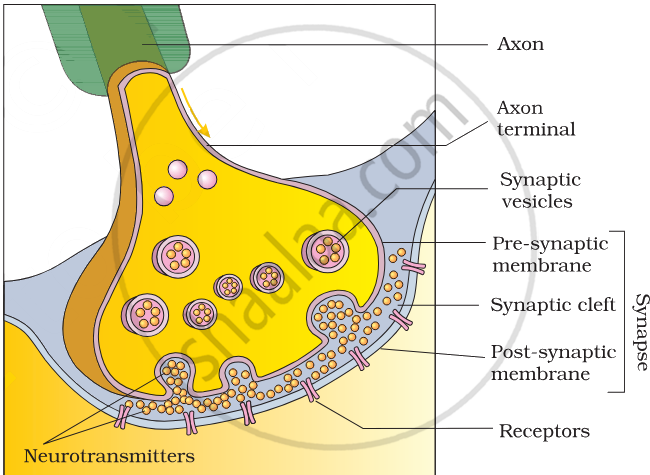Advertisements
Advertisements
प्रश्न
Explain the following process:
Transmission of a nerve impulse across a chemical synapse
उत्तर १
- A nerve impulse is sent across a chemical synapse, which is a fluid-filled gap between the membranes of pre- and post-synaptic neurons known as the synaptic cleft. These synapses use chemicals known as neurotransmitters to convey impulses. These neurotransmitters are stored in vesicles at the axon terminals.
- When an impulse (action potential) arrives at the axon terminal, it stimulates synaptic vesicles to migrate towards the membrane, where they fuse with the plasma membrane and burst, releasing neurotransmitters into the synaptic cleft.
- The released neurotransmitters bind to certain receptors found on the post-synaptic membrane. This interaction opens ion channels, allowing ions to enter and generate a new potential in the postsynaptic neuron. The new potential created can be either excitatory or inhibitory.
उत्तर २
- There is a synapse between the end button located at the end of the axon and the dendrite of another nerve cell.
- Therefore, transmission of impulses at this place takes place through a special chemical substance called a neurohormone called acetylcholine.
- On receiving the impulse, the secretory vesicles present in the end button secrete acetylcholine. This substance establishes the functional potential in the dendrite of the second nerve cell.
- Now this potential, in the form of an impulse, continues to move forward along the entire length of the next nerve fibre.
- Thus, acetylcholine acts like a chemical messenger. Later, acetylcholine is degraded by the coenzyme acetylcholinesterase.

APPEARS IN
संबंधित प्रश्न
Compare the following:
Resting potential and action potential
Give a brief account of Mechanism of synaptic transmission.
A person is showing symptoms like increased BMR, heart rate, pulse rate, blood pressure and deposition of fats in eye sockets. Name the disease he is suffering from.
Sketch and label formation of typical spinal nerve.
Long answer question.
Explain the process of conduction of nerve impulses up to the development of action potential.
Complete the flowchart of the process of conduction of nerve impulses.
| Application of stimulus on a resting nerve |
| ⇓ |
| Permeability of membrane changes |
| ⇓ |
| ______________________________ |
| ⇓ |
| Positive ions inside axon increases |
| ⇓ |
| ________________________________ |
| ⇓ |
| Polarity reverses and depolarisation takes place |
| ⇓ |
| Repolarisation - potassium gates open |
| ⇓ |
| ______________________________ |
| ⇓ |
| ______________________________ |
| ⇓ |
| Axoplasm becomes negatively charged and ECF becomes positive |
What are the number of Na+ ions pumped out, and K+ ions pumped into the cell, with respect to the Na+ - K+ pump?
Which ions is the resting membrane more permeable to?
Match the Column - I with Column - II:
| Column I | Column II | ||
| i. | P - wave | p. | Depolarisation of ventricles |
| ii. | QRS complex | q. | Repolarisation of ventricles |
| iii. | T - wave | r. | Coronary ischemia |
| s. | Development of atria | ||
| t. | Repolarisation of atria |
Neurotransmitters are removed from synaptic cleft by ____________ after transmission of impulse.
What is the average potential difference across the nerve cell membrane?
Under which of the following conditions will the ionic gradients across the resting membrane be maintained?
Which of the following is TRUE for the external tissue fluid in polarized state?
Which of the following situations is responsible for resting membrane potential?
Identify the value of action potential.
Identify the correct path of transmission of nerve impulse.
Resting membrane potential is maintained by ______.
The electronegativity inside the membrane is due to
Write one word for the following:
Point of contact between two nerve cells.
